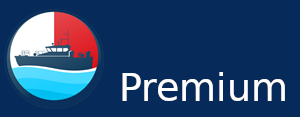Overview of studies published on Marine-Pilots.com
Article Factors affecting maritime pilots' health and well-being: a systematic review
published on 18 June 2021
Article Standard for Health Assessment of Marine Pilots - NSW (2009)
published on 22 June 2021
Article Predicting Maritime Pilot Selection with Personality Traits
by Marine-Pilots.com - published on 7 July 2021
Article Investigation of ship maneuvering with hydrodynamic effects between ship and bank
by Marine-Pilots.com - published on 12 July 2021
Article The Risks of Remote Pilotage in an Intelligent Fairway - preliminary considerations
published on 28 July 2021
Article Maritime Pilots’ Risky Operational Behavior Analysis Based on Structural Equation Model
published on 12 October 2022
Article Study: "An evaluation of fatigue factors in maritime pilot work scheduling"
by Marine-Pilots.com - published on 17 September 2020
Article Psychophysical stress and strain of maritime pilots in Germany. A cross-sectional study
published on 12 June 2021
Article Study: "Performance assessment in full-scale simulators"
published on 14 July 2021
Article Study: Online survey among maritime pilots: job-related stress...
published on 2 September 2021
Related content
Video Maritime Pilotage, Monitoring Pilot Orders , (By ATSB)
published on 11 January 2023
Article Psychophysical stress and strain of maritime pilots in Germany. A cross-sectional study
published on 12 June 2021
Article Standard for Health Assessment of Marine Pilots - NSW (2009)
published on 22 June 2021
Video Maritime Pilot - Stopping the ship - Episode 6
by Dr. Captain Ahmed Sati - published on 2 September 2024
Video Future Fairway Navigation Final Seminar 2022: Remote Pilotage
published on 12 January 2023
Video Laurentian Pilotage Authority (Image Film)
published on 22 June 2022
Video Look at Life - City of Sailors - Portsmouth - 1965, UK
published on 18 March 2021
Article Overview of Associated British Ports Marine Pilot Apprenticeships
published on 8 November 2020
Article Book launch: “Marine Pilotage – The Arabic book”
published on 22 May 2021
“Marine Pilotage – The Arabic book" by Ahmed Sati, Marine Pilot at P&O Maritime, is the first of its kind in Arabic language and specifically concerned with maritime pilotage, it is a reference book and introduction to the basics of the Marine Pilot's work for Arabic readers who are willing to take the challenge and join the force of Pilotage and to act as a refresher to the experienced Pilots who are practicing Pilotage in local or foreign organizations.


